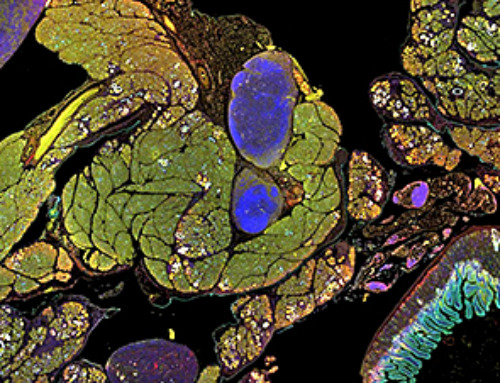A new study reveals regulators of genetic activity that are linked to the immune response against COVID-19. Alterations in their expression during the initial stages of infection are associated with blood traits underlying COVID-19 severity.
A group of scientists from NYU Abu Dhabi, under the leadership of Associate Professor of Biology, Youssef Idaghdour, collaborated with medical experts from several hospitals in Abu Dhabi to examine the link between microRNAs – small RNA molecules that regulate gene activity – and the severity of COVID-19 in 259 unvaccinated patients living in Abu Dhabi. They pinpointed certain microRNAs that correspond with a diminished immune response and a higher likelihood of ICU admission.

NYUAD Associate Professor of Biology Dr. Youssef Idaghdour.
Credit: Courtesy of NYU Abu Dhabi
During this process, they created the first genomic picture of the architecture of blood microRNAs in unvaccinated COVID-19 patients from the Middle East, North Africa, and South Asia regions whose populations are consistently underrepresented in genomics research.
The results of the system’s genetics study demonstrate that a patient’s genetic makeup affects immune function and disease severity, offering new insights into how patient prognosis and treatment can be improved. Given the diversity of the sample, there is promise that these findings can be applied to approximately thirty percent of the world’s population who reside in the MENA region and South Asia.
The findings were recently published in the journal Human Genomics. the research team presents the results of the analysis of multiple omics datasets—genotypes, miRNA, and mRNA expression of patients at the time of hospital admission, combined with phenotypes from electronic health records. The researchers analyzed 62 clinical variables and expression levels of 632 miRNAs measured at hospital admission, as well as identified 97 miRNAs associated with eight blood phenotypes significantly associated with ICU admission.
“These findings improve our understanding of why some patients withstand COVID-19 better than others,” said Idaghdour. “This study demonstrates that microRNAs are promising biomarkers for disease severity, more broadly, and targets for therapeutic interventions. The methods of this study can be applied to other populations to further our understanding of how gene regulation can serve as a core mechanism that impacts COVID-19 and, potentially, severity of other infections.”
News
Studies detail high rates of long COVID among healthcare, dental workers
Researchers have estimated approximately 8% of Americas have ever experienced long COVID, or lasting symptoms, following an acute COVID-19 infection. Now two recent international studies suggest that the percentage is much higher among healthcare workers [...]
Melting Arctic Ice May Unleash Ancient Deadly Diseases, Scientists Warn
Melting Arctic ice increases human and animal interactions, raising the risk of infectious disease spread. Researchers urge early intervention and surveillance. Climate change is opening new pathways for the spread of infectious diseases such [...]
Scientists May Have Found a Secret Weapon To Stop Pancreatic Cancer Before It Starts
Researchers at Cold Spring Harbor Laboratory have found that blocking the FGFR2 and EGFR genes can stop early-stage pancreatic cancer from progressing, offering a promising path toward prevention. Pancreatic cancer is expected to become [...]
Breakthrough Drug Restores Vision: Researchers Successfully Reverse Retinal Damage
Blocking the PROX1 protein allowed KAIST researchers to regenerate damaged retinas and restore vision in mice. Vision is one of the most important human senses, yet more than 300 million people around the world are at [...]
Differentiating cancerous and healthy cells through motion analysis
Researchers from Tokyo Metropolitan University have found that the motion of unlabeled cells can be used to tell whether they are cancerous or healthy. They observed malignant fibrosarcoma cells and [...]
This Tiny Cellular Gate Could Be the Key to Curing Cancer – And Regrowing Hair
After more than five decades of mystery, scientists have finally unveiled the detailed structure and function of a long-theorized molecular machine in our mitochondria — the mitochondrial pyruvate carrier. This microscopic gatekeeper controls how [...]
Unlocking Vision’s Secrets: Researchers Reveal 3D Structure of Key Eye Protein
Researchers have uncovered the 3D structure of RBP3, a key protein in vision, revealing how it transports retinoids and fatty acids and how its dysfunction may lead to retinal diseases. Proteins play a critical [...]
5 Key Facts About Nanoplastics and How They Affect the Human Body
Nanoplastics are typically defined as plastic particles smaller than 1000 nanometers. These particles are increasingly being detected in human tissues: they can bypass biological barriers, accumulate in organs, and may influence health in ways [...]
Measles Is Back: Doctors Warn of Dangerous Surge Across the U.S.
Parents are encouraged to contact their pediatrician if their child has been exposed to measles or is showing symptoms. Pediatric infectious disease experts are emphasizing the critical importance of measles vaccination, as the highly [...]
AI at the Speed of Light: How Silicon Photonics Are Reinventing Hardware
A cutting-edge AI acceleration platform powered by light rather than electricity could revolutionize how AI is trained and deployed. Using photonic integrated circuits made from advanced III-V semiconductors, researchers have developed a system that vastly [...]
A Grain of Brain, 523 Million Synapses, Most Complicated Neuroscience Experiment Ever Attempted
A team of over 150 scientists has achieved what once seemed impossible: a complete wiring and activity map of a tiny section of a mammalian brain. This feat, part of the MICrONS Project, rivals [...]
The Secret “Radar” Bacteria Use To Outsmart Their Enemies
A chemical radar allows bacteria to sense and eliminate predators. Investigating how microorganisms communicate deepens our understanding of the complex ecological interactions that shape our environment is an area of key focus for the [...]
Psychologists explore ethical issues associated with human-AI relationships
It's becoming increasingly commonplace for people to develop intimate, long-term relationships with artificial intelligence (AI) technologies. At their extreme, people have "married" their AI companions in non-legally binding ceremonies, and at least two people [...]
When You Lose Weight, Where Does It Actually Go?
Most health professionals lack a clear understanding of how body fat is lost, often subscribing to misconceptions like fat converting to energy or muscle. The truth is, fat is actually broken down into carbon [...]
How Everyday Plastics Quietly Turn Into DNA-Damaging Nanoparticles
The same unique structure that makes plastic so versatile also makes it susceptible to breaking down into harmful micro- and nanoscale particles. The world is saturated with trillions of microscopic and nanoscopic plastic particles, some smaller [...]
AI Outperforms Physicians in Real-World Urgent Care Decisions, Study Finds
The study, conducted at the virtual urgent care clinic Cedars-Sinai Connect in LA, compared recommendations given in about 500 visits of adult patients with relatively common symptoms – respiratory, urinary, eye, vaginal and dental. [...]





















